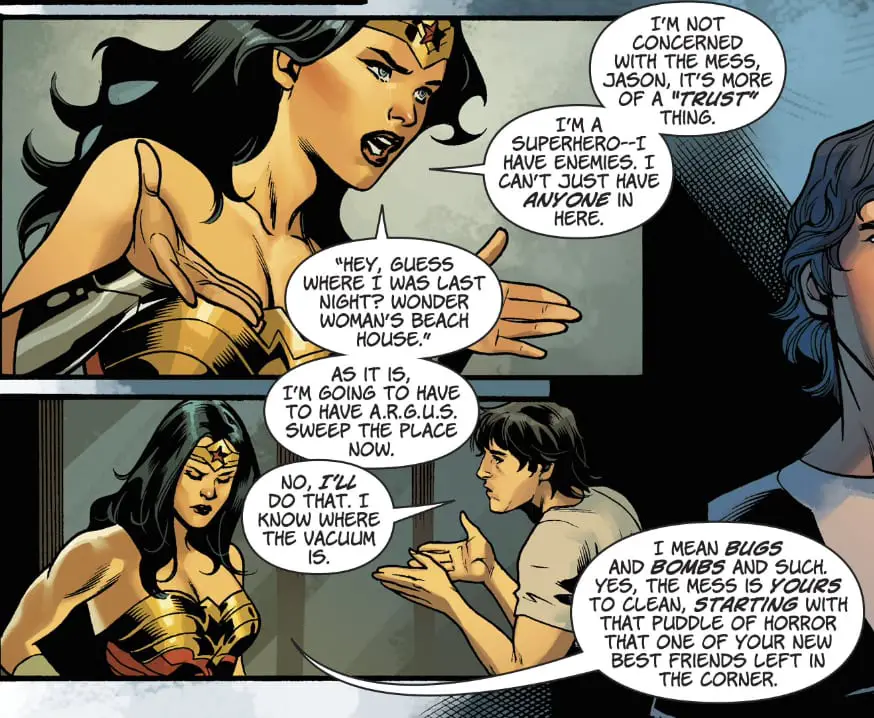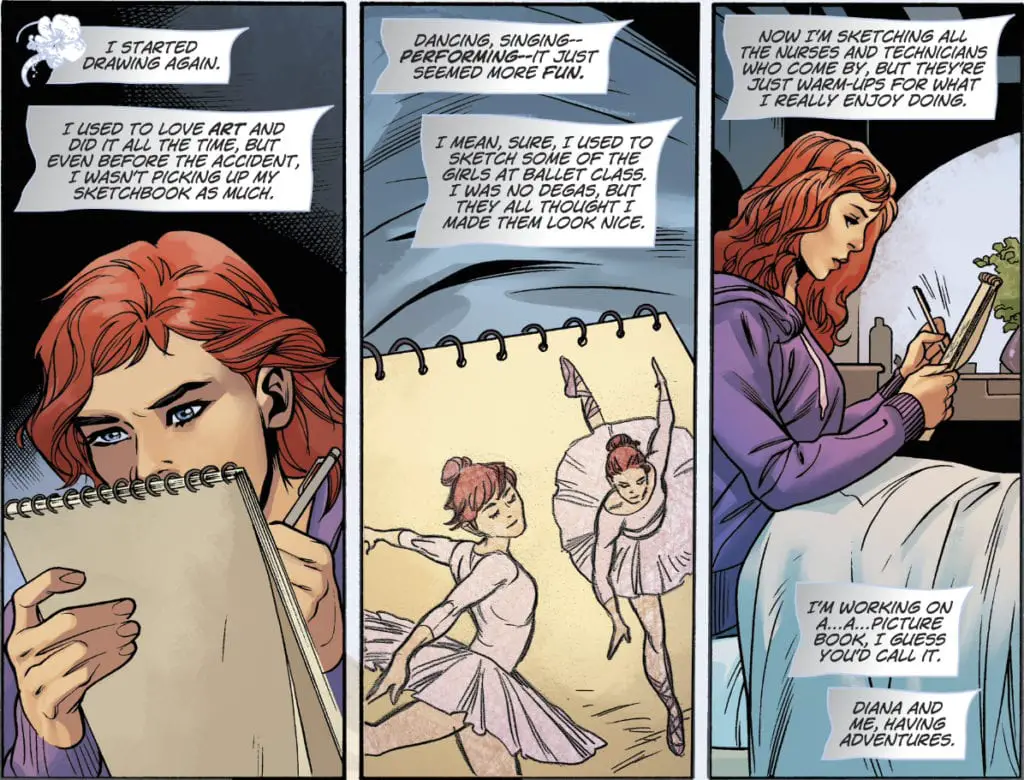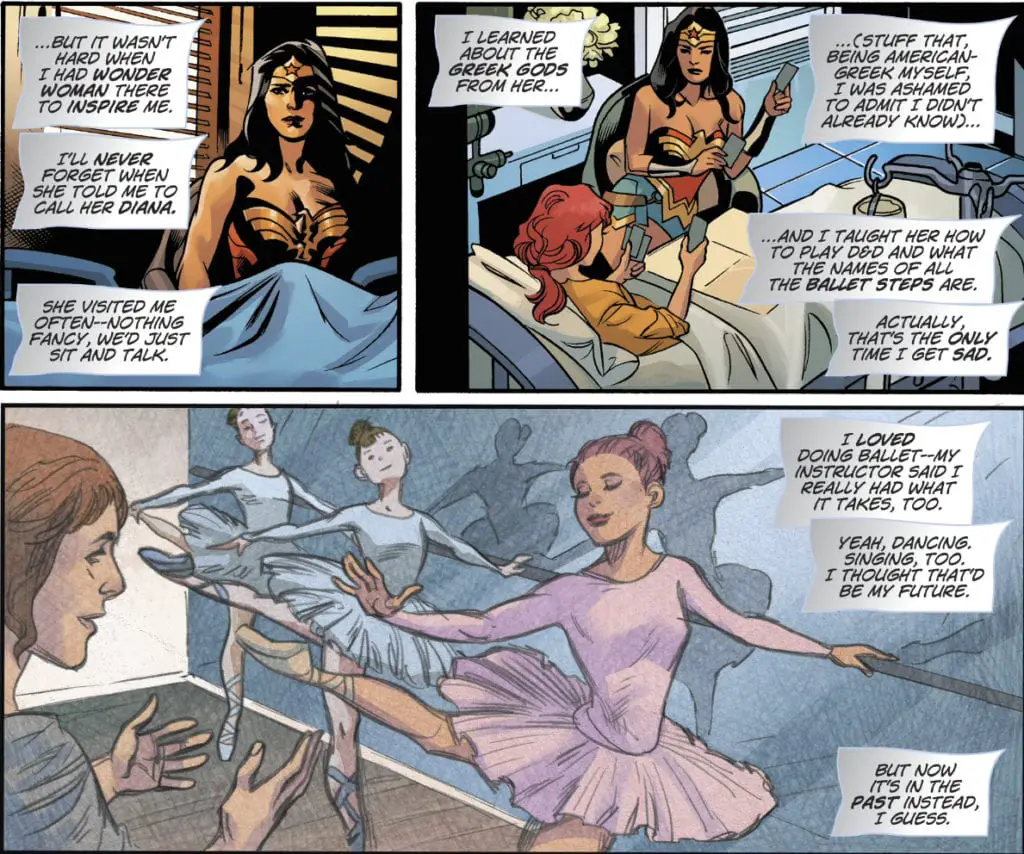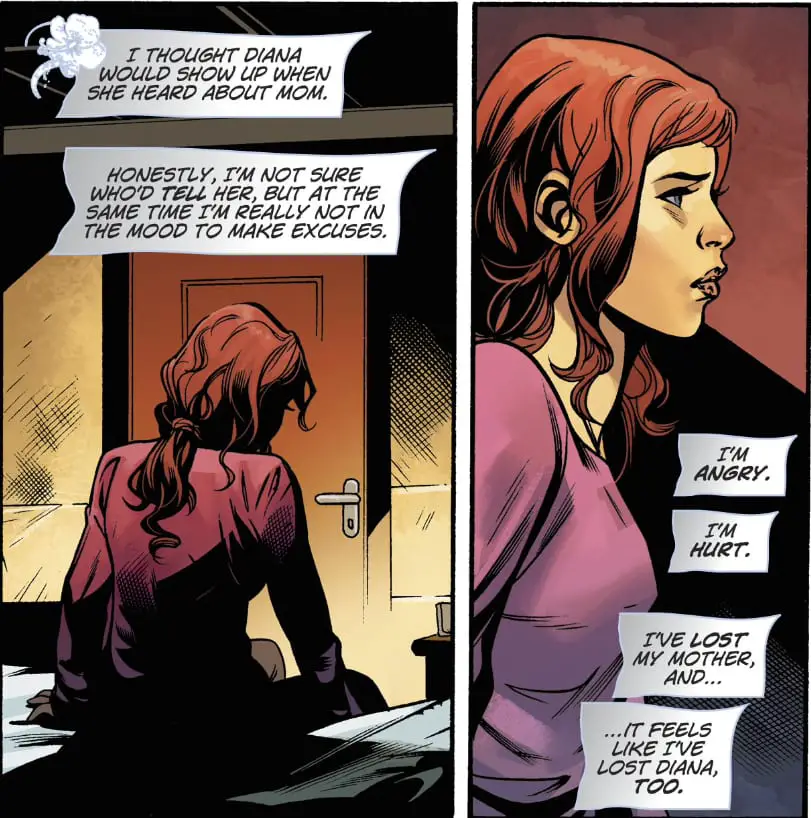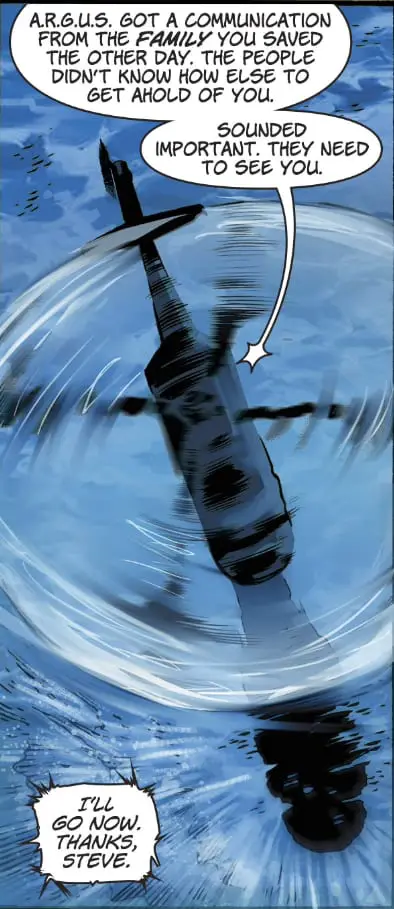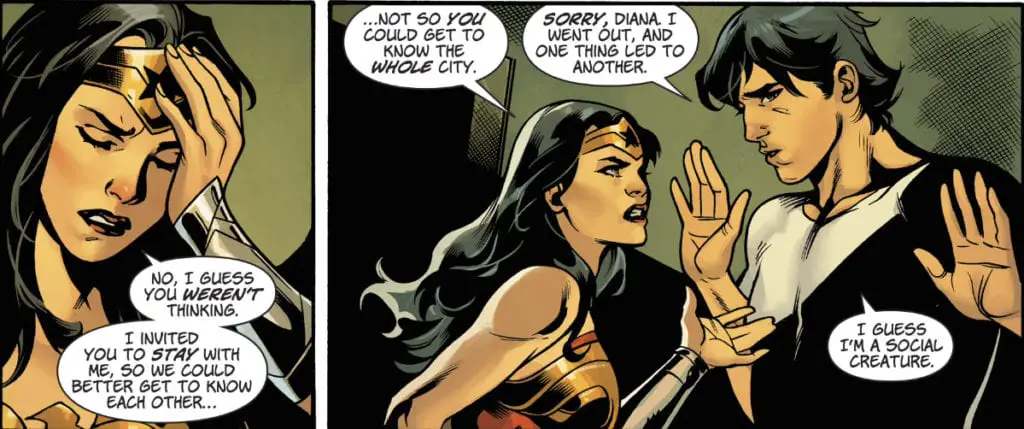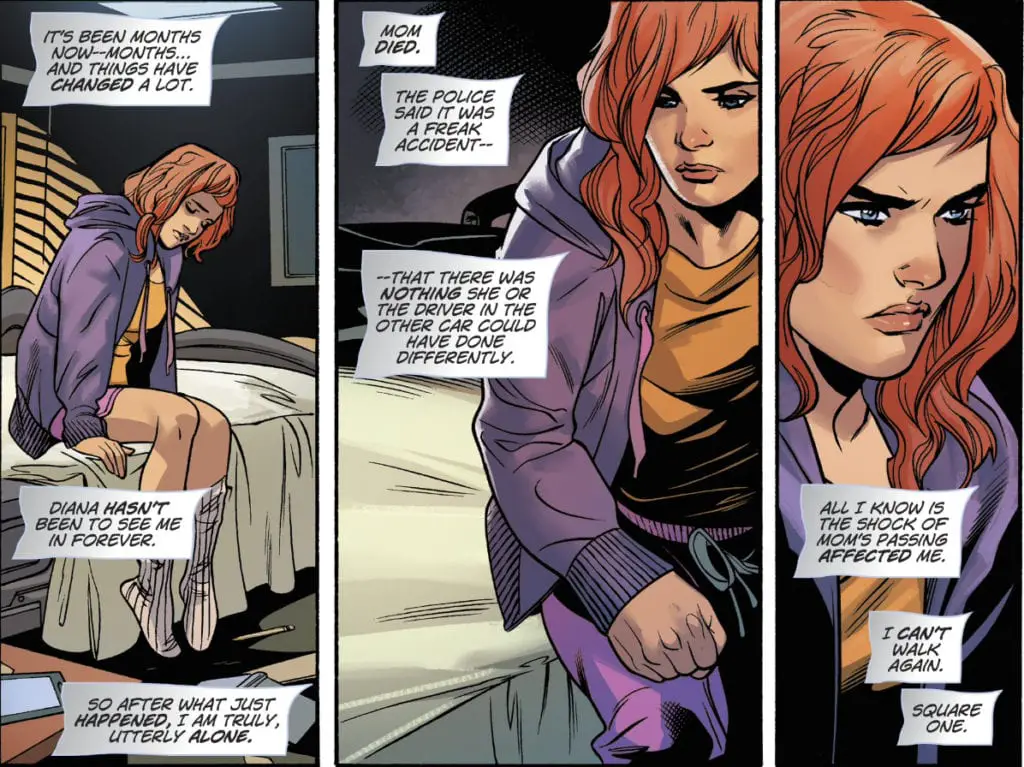At the beginning of issue #38, part one of “Swan’s Song”, I thought we had turned a corner for the Wonder Woman series. The last issue got me to completely give up on this comic, but with this new arc it seemed like James Robinson had pulled a complete 180-degree reversal and magically figured out what this series needed. Not perfect, mind you, but when I was about halfway into the issue it looked like a giant leap in the right direction and enough to get me to hope that this issue would pull out a win.
Then I kept reading and…Oy.
At least I get the satisfaction of saying that the comic has continued to live down to my low expectations.
Recap
We open in the middle of an attempted bank robbery by Major Disaster, one of the perennial c-list villains (And sometimes pseudo-hero) of the DC Universe. He is stopped by Wonder Woman, but in the course of their fight the destruction is widespread and a bystander is trapped beneath falling rubble. Wonder Woman holds the debris off her long enough for Steve Trevor to rescue her, and then Wonder Woman deals with Major Disaster himself. Unfortunately, the bystander — Vanessa Kapatelis, an aspiring ballerina — is paralyzed from the waist down due to her injuries and is told that she will never walk again.
Diana accompanies Vanessa to the hospital and does her best to help her recuperate and restructure her life. Through becoming friends with Diana, Vanessa is able to accept what has happened to her and redirects her energies into art and drawing, even working on creating an in-universe comic book starring Wonder Woman, and casting herself as another hero: the Silver Swan. She is far from happy over what happened, but at least she is able to deal with it and recognize that there is still opportunity in her life.
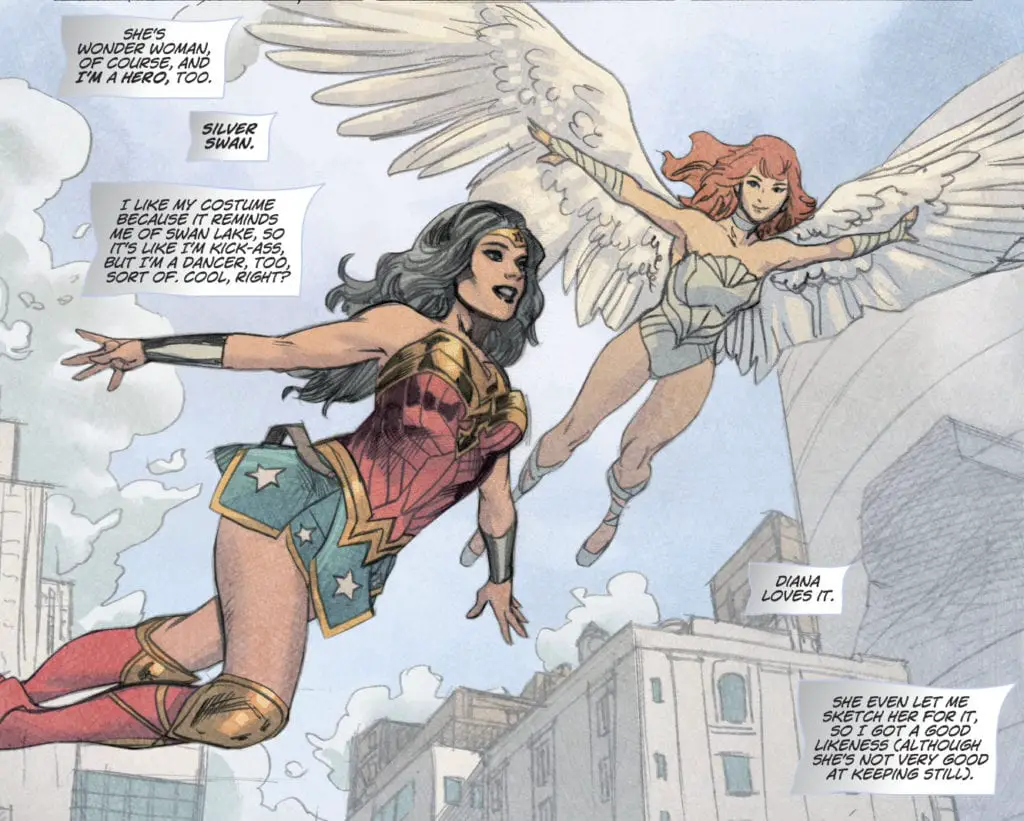
Things change when Diana’s visits become more and more infrequent as time passes, and Vanessa’s recuperation comes to a crashing halt when her mother dies in a random traffic accident. Feeling abandoned, she sees on the news that Wonder Woman has rescued another family from disaster, but resents that they were rescued together and unharmed, while she is crippled and alone.
The comic then jumps to Diana’s home, where her brother Jason — who is apparently living with her now — has thrown a wild party and there are passed-out revelers strewn throughout the place. Diana reads him the riot act, explaining that the issue isn’t that he had a party, but that he had an uncontrolled party at her home when he has claimed to want to be a superhero. With random people coming in and out of her house she doesn’t know if any of them are secretly super villains or otherwise dangerous, so now they will need to have A.R.G.U.S. search for listening devices or hidden dangers and other practical follow-ups. She explains to Jason that if he really wants to be a superhero he has to take it seriously, because the people who try to do it for fun never last, either quitting or winding up dead.
In the middle of this, Diana gets a call from Steve Trevor who explains that Giganta gave them the list of other artifacts that Darkseid had wanted her to steal, and now he and the Oddfellows are en route to investigate them. When she offers to come with he explains that they can handle it, and the real reason he called was to pass along a message from the Darling family, the people Vanessa had seen Wonder Woman save earlier in the issue. They have some sort of problem and need her help.
Arriving at the Darling residence, Wonder Woman gets no response when she knocks, and she enters to find the family all murdered. Vanessa Kapatelis — now in a standard supervillain costume and using the moniker ‘Silver Swan’ — reveals herself and prepares to attack as the issue comes to a close.
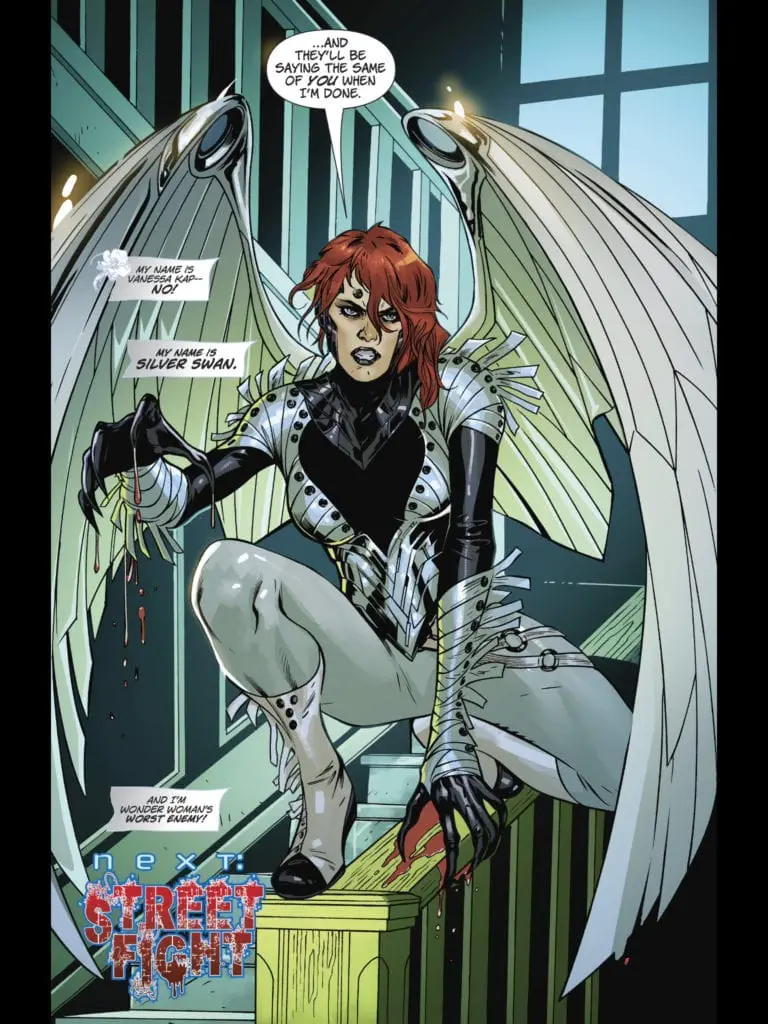
Review
We were close — so close — to having a good issue.
Wonder Woman as an Inspiration
The reason I say that the issue started strong is because it hammered on the concept that Wonder Woman does so much more for the world than just hit bad people. She serves as an inspiration, as a beacon of hope and optimism, and is personally caring and kind to the random bystanders she meets in the course of her heroics. Having the issue show us Diana from Vanessa’s perspective was great, as was its exploration of Diana continuing to visit her in the hospital and help with her recuperation. It shows why Diana is so beloved, and the best aspects of the true heroes of comicbooks. These segues explain how the heroes we admire really try and fix problems with therapy and emotional support, not just cover them up with a band-aid applied by a fist.
On a technical story crafting level, it also kept the focus on Diana despite featuring a different character as the main viewpoint. A critique I leveled at every preceding issue of James Robinson’s run has been that Wonder Woman wasn’t the main character of the story even when she was the viewpoint character, because it was about somebody else. Usually about Jason, with some issues about Darkseid and Zeus, with none of them about her. When this issue began, however, even though we were following Vanessa the story was still about Wonder Woman and the way she impacted Vanessa’s life.
It was all going so well. Until…
Why did Wonder Woman abandon Vanessa?
Vanessa’s slide into villainy started when Wonder Woman stopped visiting, but the issue never explains why she stopped showing up. They do address why she stopped showing up as much — Wonder Woman is very busy and there simply aren’t enough hours in the day for her to visit everybody she has ever saved on a regular basis — but they never say why she is completely absent over what seems like a period of several months. Why hasn’t she called or sent a letter? Even a quick pop-in to check up would have done wonders for Vanessa’s outlook, especially after her mother died and she had no remaining family, but there’s nothing.
You might try to explain it by saying that Diana simply wasn’t aware of how bad things had gotten since she cannot be expected to check up on everybody she ever met, except that the issue explains that Vanessa’s rehabilitation therapy is based on the superhero Cyborg’s experimental technology. Diana had to have some sort of connection to setting that up, so why didn’t they call her when Vanessa’s mother died to let her know she had relapsed? Also, when Vanessa turns evil it is apparently very easy for her to get a message to Diana through A.R.G.U.S., so why didn’t she reach out and say “Where are you?”
Why are we still dealing with Jason?
The jump to Jason living at Diana’s place was just a mess, and it’s such a mess that I can’t even articulate all the problems. We see absolutely no mourning for the death of Zeus in the last issue, even though Diana and Jason were both so overcome with grief at the time (I might have really hated showing them overcome with grief, but it happened so the comic needs to deal with that). We also see no mourning by Jason for Hercules, his actual father figure who died several issues ago. They tried to dodge his lack of grief in issue #36 by saying that the news was so new that he didn’t have time to process it yet, but now it’s presumably been a while and he still shows no remorse for signing up with the people who killed him.
The current story of Jason being “wild” also doesn’t make any sense, because they try to frame it as the sheltered country bumpkin losing control when he comes to the big city and sees all its sinful opportunities. Diana even says that his behavior is understandable given that he grew up in a fishing village…except that issue #35 — the flashback issue which specifically introduced us to Jason’s history — showed that he spent his adulthood partying and going clubbing with multiple women on his arm. He isn’t sheltered and unused to the material world, he’s been a self-interested party-boy all along.
Jason seems to have received absolutely no punishment or censure for the way he tried to offer up Wonder Woman to Darkseid as food, or for the role he played in getting Zeus killed. He continues to try and blame his behavior on other people, particularly the way that Hippolyta “abandoned” him by giving him to Glaucus. There is no reference made to any training or supervision that he is undergoing in order to become a Proper Hero, either. The entire situation is treated as though he is just Diana’s wild brother who is staying with her while he is in town, and not an uncontrolled potential-supervillain who has already shown severe instability and a willingness to take out his frustrations on those around him

The fact that Diana is stuck babysitting Jason while the Oddfellows track down Giganta’s lead is part and parcel of a larger problem, and the same type of sidelining that has been happening to Wonder Woman throughout James Robinson’s entire run. She is the superhero, the one with abilities and skills beyond that of mortal men, and she has greater personal experience dealing with Giganta and Darkseid than all of the Oddfellows combined. This should be her mission, not theirs, and they should only be tagging along as support. The fact that they apparently didn’t even mention the mission to her until they are already on the way, meaning they have presumably spent a lot of time briefing people on the mission and getting supplies and so on, relegates her to a bottom-level secondary character in what should be her story.
How old is Vanessa supposed to be?
Moving on to the purely technical issues with the story, the portrayal of Vanessa is bizarrely inconsistent. In some panels during the beginning she is drawn young/small and I’d guess her age in those panels to be somewhere in her early teens. The almost childlike fantasy obsession she has with Wonder Woman throughout supports that, casting herself as Diana’s best friend and dreaming of adventures they would have together. Even her final reveal — when she is standing over the bodies of the family she murdered — is filled with childish melodrama as she narrates that she is Wonder Woman’s WORST ENEMY. It’s the kind of thing that I would expect of a little kid who is lashing out in anger, or somebody living out a dark fantasy.
Other panels, though, and especially the visual of her reintroduction as a villain on the final page, show her as a full-grown woman. If she’s meant to be an adult then why is her perspective so child-like?
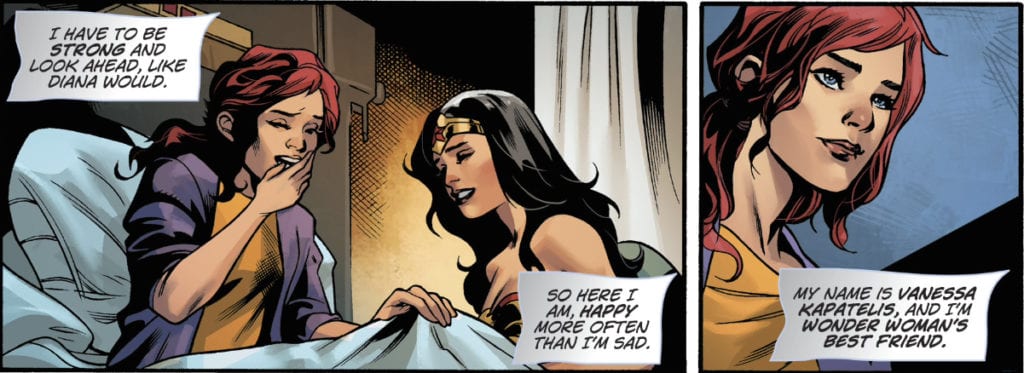
I’ve also got to wonder how Vanessa became a villain; the specific logistics. When we left her in the prologue she had relapsed back into complete paralysis after the death of her mother, but now she has mastered the technology which grants her mobility to such an extent that she can travel and murder people? It took weeks for her just to be able to stand and take a few steps, it should have taken months of work to gain this level of mobility. Except that Steve Trevor refers to the Darlings as the family that Wonder Woman saved “the other day”, which means that it has been at most a week since that scene of Vanessa staring at them on the news filled with resentment, and how did she get to SUPER mobility in this time frame?
Why is Vanessa a supervillain?
It is such a worn-out cliche to have supervillains be “created” by their heroes that I just do not have the energy to dig into this here. There are too many instances where they explain their villainy because the hero failed to save them from another villain, or didn’t “care” enough, and it is usually used as an indictment of superheroes everywhere. Except that Diana does care, we have seen it not just in other issues but even in this one, and it’s moronic as a story development for her to give a future supervillain the technological support she needs to wreak havoc.
Once we got past the introduction, this story just does not work on any level.



